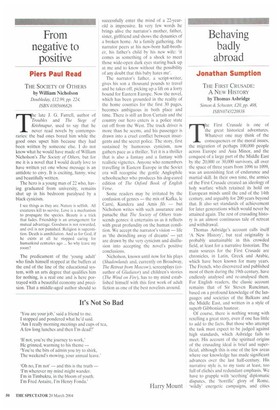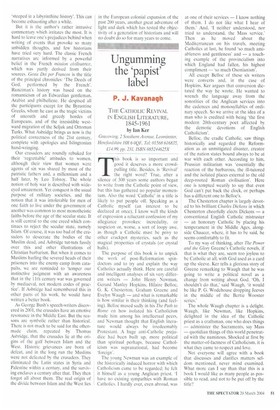Behaving badly abroad
Jonathan Sumption
THE FIRST CRUSADE: A NEW HISTORY by Thomas Asbridge Simon & Schuster, £20, pp. 408, ISBN0743220838 The First Crusade is one of the great historical adventures. Whatever one may think of the consequences or the moral issues, the migration of perhaps 100,000 people across Europe and Asia Minor, and the conquest of a large part of the Middle East by the 20,000 or 30,000 survivors, all over the space of three years from 1096 to 1099, was an astonishing feat of endurance and martial skill. In their own time, the armies of the First Crusade created an ideology of holy warfare which retained its hold on European minds until the end of the 14th century, and arguably for 200 years beyond that. It also set standards of achievement for later generations which would never be attained again. The rest of crusading history is an almost continuous tale of retreat and withdrawal.
Thomas Asbridge's account calls itself 'A New History', but real originality is probably unattainable in this crowded field, at least for a narrative historian. The main sources for the First Crusade are chronicles, in Latin, Greek and Arabic, which have been known for many years. The French, who discovered and published most of them during the 19th century, have endlessly analysed and re-analysed them. For English readers, the classic account remains that of Sir Steven Runciman, based on a profound knowledge of the languages and societies of the Balkans and the Middle East, and written in a style of superb Gibbonian hauteur.
Of course, there is nothing wrong with retelling a great story, even if one has little to add to the facts. But those who attempt the task must expect to be judged against high standards, which Asbridge fails to meet. His account of the spiritual origins of the crusading ideal is brief and superficial, although this is one of the few areas where our knowledge has made significant advances over the last half-century. His narrative style is, to my taste at least, too full of clichés and redundant emphasis. We have to grapple with 'seething' diplomatic disputes, the 'horrific' glory of Rome. 'wildly' energetic campaigns, and cities
'steeped in a labyrinthine history'. This can become exhausting after a while.
But it is the author's rather intrusive commentary which irritates the most. It is hard to leave one's prejudices behind when writing of events that provoke so many unbidden thoughts, and few historians have tried very hard. The classic French narratives are informed by a powerful belief in the French mission civilisatrice, which was partly derived from their sources. Gesta Del per Francos is the title of the principal chronicles: The Deeds of God, performed by the French'. Runciman's history was based on the romanticism of an Edwardian gentleman, Arabist and philhellene. He despised all the participants except for the Byzantine Greeks, whom he cast as the tragic victims of uncouth and greedy hordes of Europeans, and of the irresistible westward migration of the Seljuk and Ottoman Turks. What Asbridge brings us now is the political correctness of the 21st century, complete with apologies and Islingtonian hand-wringing.
Our crusaders are roundly rebuked for their 'regrettable' attitudes to women, although their view that women were agents of sin was shared by most of the patristic fathers and, a millennium and a half later, by Leo Tolstoy. The whole notion of holy war is described with wideeyed amazement. Yet conquest is the usual purpose of military societies, and the notion that it was intolerable for men of one faith to live under the government of another was common to most monotheistic faiths before the age of the secular state. It is still central to the one creed which continues to reject the secular state, namely Islam. Of course, it was too bad of the crusaders to desecrate the bodies of the Muslim dead, and Asbridge tut-tuts fussily over this and other illustrations of Christian barbarism. But when it comes to Muslims hurling the severed heads of their prisoners into the enemy camp from catapults, we are reminded to 'temper our instinctive judgment with an awareness that in the 11th century war was governed by mediaeval, not modern codes of practice'. If Asbridge had remembered this in other parts of his work, he would have written a better book.
As George Bush's speech-writers discovered in 2001, the crusades have an emotive resonance in the Middle East. But the reasons are symbolic rather than historical. There is not much to be said for the oftenmade claim, repeated by Thomas Asbridge, that the crusades lie at the origins of the gulf between Islam and the West. Historic grievances are born of defeat, and in the long run the Muslims were not defeated by the crusaders. They eliminated the Latin states in Syria and Palestine within a century, and the surviving enclaves a century after that. They then forgot all about them. The real origin of the divide between Islam and the West lies in the European colonial expansion of the past 200 years, another great adventure of light and dark which has tested the objectivity of a generation of historians and will no doubt do so for many years to come.



















































































 Previous page
Previous page